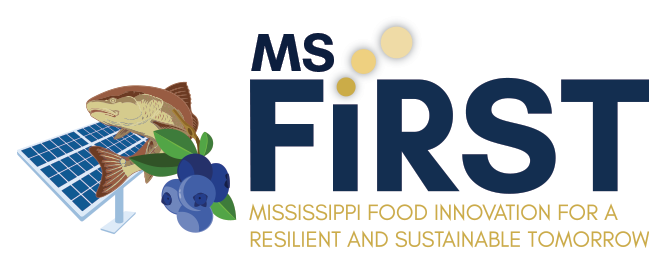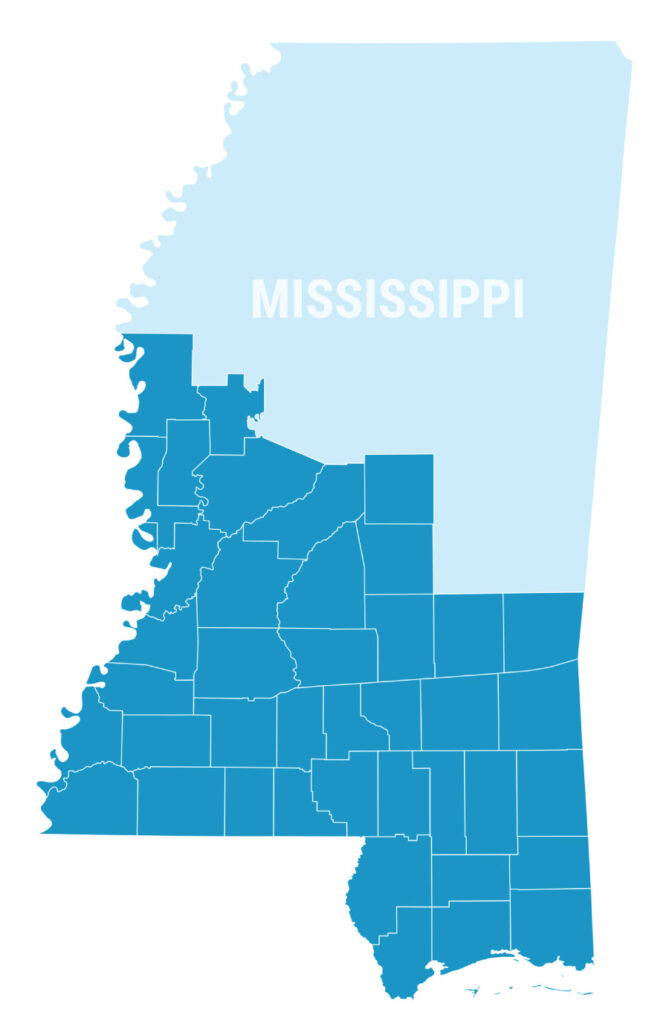
Vision:
The vision of the engine is to create an equitable and inclusive innovation ecosystem that harmonizes a network of educational institutions, farmers, small businesses, corporations, governments, and community stakeholders enabling conditions for mitigating human and societal impacts of food insecurity exacerbated by worsening climate events.
 Region of Service and Competitive Advantage:
Region of Service and Competitive Advantage:
The Region of Service is a 41-county area covering Central and South Mississippi. Mississippi is a rural EPSCoR state with significant agriculture and food industry sectors. The University of Southern Mississippi, an R1 Doctoral Research University, is globally recognized for its polymer and ocean science engineering programs, and the Thad Cochran Marine Aquaculture Center. Jackson State University, a public HBCU and R2 Doctoral Research University, is recognized for successfully producing STEM graduates from underrepresented communities. Beyond the partner organizations and their capabilities, the region’s high food insecurity rates and access to farmers represent two key endpoints to be addressed via implementation and testing of solutions that will connect fresh, healthy foods to those in need. Proximity to the Mississippi River and the Gulf Coast provides an ideal environment for developing and testing climate-resilient food systems innovations.
Challenges and Key Technology Areas:
The focus is to create translational research pathways that promote acceptance and adoption of solutions that mitigate the challenges associated with the negative climate impacts on sustainable food production and distribution, while improving access to healthy foods. Applicable key technology areas include agri-tech, recirculating aquaculture systems, controlled environment farming, food distribution logistics, and health informatics.

Engine Goal:
The goals are to employ use-inspired multidisciplinary research and community driven technology interventions to promote food security, improve health outcomes, develop a highly skilled workforce, and generate equitable economic opportunities for underserved populations.
High-Impact Outcome Potential:
MSFIRST will develop technology-based multidimensional solutions for the pervasive problems of food insecurity exacerbated by natural disasters. The impact of the solutions will be assessed in terms of improvements to key socioeconomic indicators, including jobs created with above average wages, SNAP benefit utilization, and long-term health outcomes, including obesity and diabetes rates. The solutions to food insecurity discovered and developed in Mississippi will serve as national and global models in areas facing similar challenges, thus expanding the scope of the Engine’s impacts.
Region of Service: (State) – MS (CSBAs) – Gulfport-Biloxi, MS, Hattiesburg, MS, Jackson, MS, Brookhaven, MS, Natchez, MS, Picayune, MS, Vicksburg, MS
Overarching Challenges: (1) Sustainable Food Production; (2) Equitable Food Access; (3) Resilient Food Distribution
Keywords: Agricultural Technologies, Environmental Technologies, Digital Health, Artificial Intelligence, Internet of Things
Industry Sectors: 1125 (Aquaculture), 6242 (Community Food and Housing, and Emergency and Other Relief Services), 5417 (Scientific Research and Development Services)
NSF Engine Development Award Title: Advancing Food Security and Climate Resilience (MS) VISIT SIEPROGRAM.COM »
NSF Engine Development Award ID: #2305618
PI for the Development Award: Campbell, Almesha; Whittaker, Joseph (former PI)
Lead Organization for the Development Award: Jackson State University

Joseph A. Whittaker, Ph.D.
President
Global Advisors and Analysts, LLC | University of Southern Mississippi Affiliate
Almesha L. Campbell, Ph.D.
Assistant Vice President for Research and Economic Development/Director for Technology Transfer and Commercialization
Core functions: Use-inspired Research and Development; Translation of Innovations to Practice; Diversity, Equity, Inclusion, and Accessibility. Ancillary functions: Customer Discovery; Entrepreneurial Programming; Technology Transfer and Commercialization; Innovation Management.
Kelly L. Lucas, Ph.D.
Vice President for Research
Co-Program Director/Interim COO; Administration of the Development Award; Innovation Leadership; Evaluation and Assessment.
Brian J. Cuevas, Ph.D.
Director, Office of Technology Development
Core functions: Use-inspired Research and Development; Translation of Innovations to Practice. Ancillary functions: Customer Discovery; Entrepreneurial Programming; Technology Transfer and Commercialization; Innovation Management.
Edmund Randolph Buckner, Ph.D.
Interim Associate Provost for Research, Innovation and Graduate Education
Alcorn State University